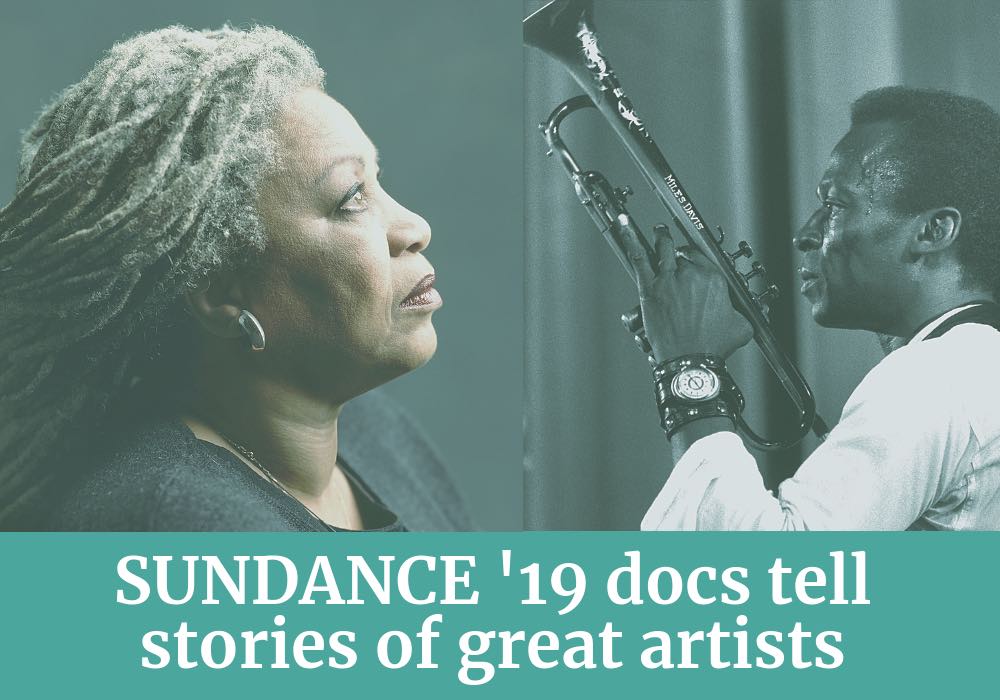Sundance continues its mission to feature stories about important African American historical figures with worthy docs Toni Morrison: The Pieces I Am and Miles Davis: Birth of Cool.

Toni Morrison: The Pieces I Am
In the last few years, Sundance has screened multiple biography documentaries about important literary and historical figures in 20th America that were people of colour, and thus effectively written out of the history books — like Yayoi Kusama in Kusama: Infinity (reviewed here), and Nina Simone in What Happened, Miss Simone? (reviewed here). Their life stories help to contextualize their art, while their specific struggles with systemic and overt racism serve as windows into wider social problems.
Timothy Greenfield-Sanders’ Toni Morrison: The Pieces I am is the best addition to this genre to date, helped enormously by the charismatic and articulate Toni Morrison herself. Before Morrison became Famous Author Toni Morrison, she worked as a book editor quietly discovering and publishing some of the most important African American thinkers of the mid-20th century, including Angela Davis. The film charts her influence in publishing and as a teacher, while also looking at the inspiration for and context of her books, how she paid her bills, and how the books were received by an often white and racist audience who could dismiss her as good “for a black woman”.
Morrison’s boundless joie de vivre and miraculous way with words make her the ideal documentary subject. The film serves as a great primer on her fiction that leave you with an urgent reading list and a desperate longing to hear Morrison talk even more at length. Morrison’s wide-ranging impact throughout the literary world is remarkable. Plus, Oprah tells a great story about the lengths she went to to find Morrison’s home phone number after reading Beloved.
Miles Davis: Birth of Cool
Stanley Nelson’s Miles Davis: Birth of Cool is an educational, if less exciting, addition to the panoply of documentaries about important African American artistic figures. Davis started playing the trumpet young, and in the few decades of his career, he discovered most of the musicians that would form the foundation of modern jazz. In the 1980s and 1990s, pretty much every major jazz musician had played with Davis, and many of them did so when they were young. Tony Williams, one of the best jazz drummers of all time, did so at age 17. In the film, jazz pianist legend Herbie Hancock tells the story of how Davis called him up to join the band when Hancock was just 19.
Birth of Cool does an excellent job contextualizing Davis’ music as ever-evolving. In the 1950s, he evolved jazz music from the popular 1950s bebop style (he actually played with Charlie Parker as a teenager) to something more fitting of a concert hall. By the 1970s, he had an electric band, was developing jazz fusion, and had laid down the foundation for modern hip hop. But the film’s insights into the man himself are much more strained, limited by the lack of footage of Davis actually talking. The film never quite accounts for Davis’s confrontational, egotistical and erratic behaviour and how it squares with his emotionally vulnerable music. But it does suggest masculine expectations and drugs played a large role.
We’re in a renaissance of documentaries chronicling jazz history, from They Called Him Morgan and What Happened, Miss Simone? (reviewed here) to now Miles Davis: Birth of Cool. Unfortunately, rarely do these films stylistically capture the spontaneity, creativity, and intellectual rigour of jazz music (though Morgan comes closest). Don Cheadle’s Davis biopic, Miles Ahead (reviewed here), which screened at Sundance back in 2016, was the rare film about jazz to bake its essence into the film’s grammar. It also offered more insight into the man, especially in his battle with systemic racism. Both films cover a notable incident in Davis’ life when he was arrested (and beaten) in front of a jazz club he was headlining talking to a white woman. Birth of Cool narrates the event and discusses its importance in Davis’s history. But Cheadle makes it absolutely harrowing;we feel its long-lasting reverberations on Davis far more deeply in Miles Ahead.

